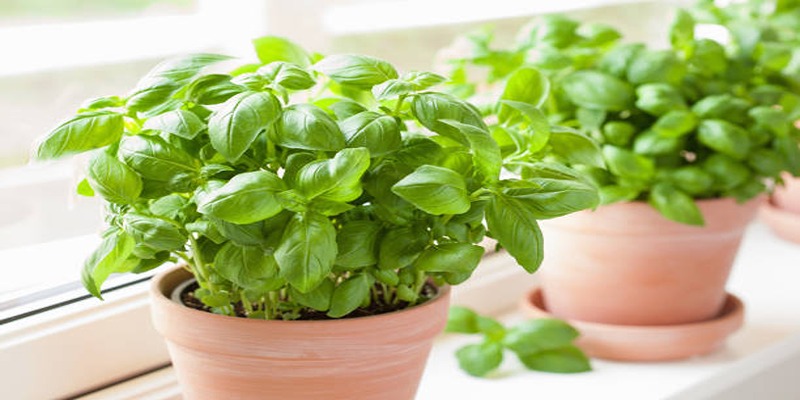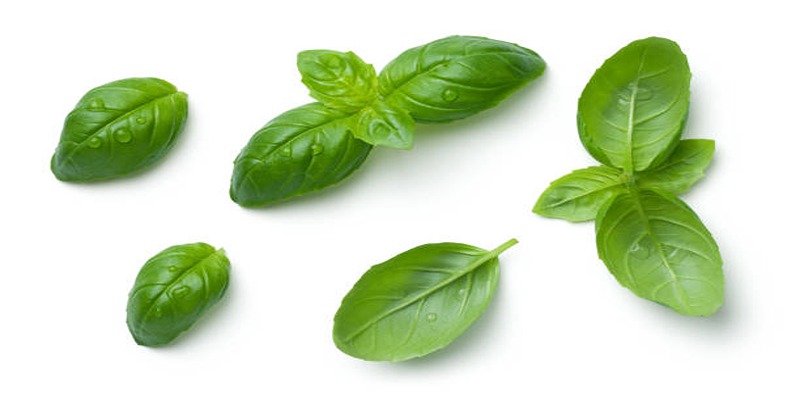Discover the Miraculous Health Benefits of Fresh Basil Leaves
Jul 09, 2024 By Nancy Miller
Fresh basil leaves are not only a staple in culinary dishes but are also packed with a multitude of health benefits. Revered for their fragrant aroma and vibrant green hue, basil leaves are rich in essential nutrients like vitamins K, A, and C, as well as minerals such as iron, calcium, and magnesium. Additionally, basil leaves boast powerful antioxidant properties that help fight inflammation and support the immune system. Incorporating fresh basil into your diet can aid in digestion, improve heart health, and even reduce stress levels. This versatile herb can be used in various formsfrom adding a burst of flavor to salads and pasta to being infused in teas and oils, offering a delicious and healthful way to enhance your well-being.
Nutritional Profile of Fresh Basil Leaves:

Fresh basil leaves are incredibly nutrient-dense, making them a valuable addition to a healthy diet. A single cup of fresh basil provides an impressive amount of vitamins and minerals. It contains high levels of vitamin K, which is crucial for blood clotting and bone health. Additionally, it offers vitamin A and vitamin C, both of which play key roles in maintaining healthy skin, vision, and immune function. Basil is also a good source of essential minerals like iron, which is vital for the production of red blood cells, calcium for strong bones and teeth, and magnesium, which supports muscle and nerve function. Furthermore, basil is low in calories and contains various phytonutrients, contributing to its antioxidant and anti-inflammatory properties.
Culinary Uses of Fresh Basil Leaves:
Fresh basil leaves are an incredibly versatile ingredient in the culinary world, adding both flavor and nutrition to a wide array of dishes. Classic dishes such as pesto sauce, Caprese salad, and Margherita pizza rely heavily on the distinct taste of basil to elevate their flavors. Beyond these traditional uses, basil can be blended into smoothies for a fresh twist, sprinkled over soups and stews for added aroma, or infused in oils and vinegars to enhance the taste profile of numerous recipes. Its unique combination of sweet and savory notes makes basil an indispensable herb in both Mediterranean and Asian cuisines.
Powerful Antioxidant Properties:
- Basil leaves contain essential oils, including eugenol, which acts as a powerful antioxidant and has anti-inflammatory properties.
- The high concentration of carotenoids in basil leaves provides potent antioxidant benefits, protecting the body against oxidative stress and cell damage.
- The flavonoids present in basil have strong antioxidant effects, helping to neutralize free radicals that can cause chronic diseases like cancer and heart disease.
- Basil also contains rosmarinic acid, which is known for its anti-inflammatory properties and ability to fight off harmful bacteria and viruses. This makes basil a valuable ingredient in boosting immune function and fighting off infections.
Basil and Digestive Health:
Fresh basil leaves offer numerous benefits for digestive health, making them a valuable addition to any diet. One of the primary ways basil aids in digestion is through its high fiber content, which promotes regular bowel movements and prevents constipation. Additionally, the essential oils in basil, such as eugenol, have been found to possess anti-inflammatory properties that can soothe the digestive tract and reduce symptoms of indigestion.
Basil also helps in maintaining a healthy gut flora, thanks to its antibacterial properties that can counteract harmful bacteria. Incorporating fresh basil into your meals can help alleviate bloating and gas, while also promoting overall digestive wellness. By adding basil to dishes like soups, salads, and smoothies, you can support a healthier digestive system naturally.
Boosting Immune System with Basil:
Fresh basil leaves are an excellent way to boost the immune system due to their rich composition of vitamins, minerals, and essential oils. Vitamin C, present in significant amounts, plays a crucial role in enhancing immune function by promoting the production of white blood cells, which are vital for fighting off infections. The antibacterial and antiviral properties of basil, attributed to compounds like eugenol and rosmarinic acid, help protect the body against pathogens.
Basil's anti-inflammatory properties also contribute to improved immune health by reducing inflammation and supporting overall body function. Integrating fresh basil into your diet can be as simple as adding it to salads, incorporating it into sauces, or blending it into refreshing smoothies, making it an easy and delicious way to reinforce your immunity on a daily basis.
Heart Health Benefits of Basil:
- Reduces Cholesterol Levels: Basil has been shown to help lower cholesterol levels, reducing the risk of atherosclerosis and other cardiovascular diseases.
- Lowers Blood Pressure: The essential oils in basil, such as eugenol, can help relax blood vessels, which in turn may help to reduce blood pressure levels.
- Rich in Antioxidants: The antioxidants in basil protect the heart by neutralizing free radicals, thereby preventing oxidative stress that can lead to heart disease.
- Anti-Inflammatory Properties: Basil contains compounds like eugenol and rosmarinic acid that have anti-inflammatory effects, reducing inflammation that could otherwise contribute to heart disease.
- Improves Circulation: The magnesium content in basil helps to relax the muscles and blood vessels, leading to improved blood circulation and better nutrient and oxygen distribution throughout the body.
- Supports Healthy Blood Sugar Levels: Basil may help in regulating blood sugar levels, which is crucial for preventing conditions like diabetes that can adversely affect heart health.
- Promotes Weight Loss: Including basil in your diet can support a healthy weight loss regimen, which indirectly benefits heart health by reducing the strain on the cardiovascular system.
- Anti-Thrombotic Properties: Some studies suggest that basil can help prevent blood clots, thereby reducing the risk of conditions such as stroke and heart attacks.
Stress Reduction through Basil Consumption:
Basil's effects on stress reduction are attributed to its adaptogenic properties, which help the body manage and adapt to stress more efficiently. The essential oils found in basil, like eugenol and linalool, have a calming effect on the mind and body, reducing anxiety and promoting relaxation. Basil also helps in maintaining balanced cortisol levels, which are crucial for managing stress. Regular consumption of basil can enhance mental clarity and focus, further reducing the impact of stress on daily life. Simple ways to incorporate basil into your diet include adding fresh leaves to salads, using them in teas, or blending them into smoothies for a refreshing and stress-relieving boost.
Ways to Incorporate Basil into Your Diet:

- Add Fresh Leaves to Salads: Enhance the flavor and nutritional profile of your salads by tossing in fresh basil leaves.
- Blend into Smoothies: Boost your smoothies with a handful of fresh basil for a refreshing, aromatic twist.
- Infuse Oils and Vinegars: Create infused oils or vinegars using basil to use as dressings or marinades.
- Make Pesto: Blend basil with pine nuts, garlic, Parmesan cheese, and olive oil to make a traditional Italian pesto sauce.
- Use as a Garnish: Sprinkle chopped fresh basil over soups, pizzas, and pasta dishes for added flavor and a pop of color.
Conclusion:
Incorporating fresh basil into your diet has numerous health benefits, from promoting digestive health and boosting immune function to supporting heart health and reducing stress. With its versatile uses in cooking and easy availability, it's a simple yet effective way to improve overall wellness naturally. So next time you're looking for a flavorful and nutritious addition to your meals, don't forget to reach for some fresh basil! So go ahead and enjoy the many benefits of this aromatic herb while adding delicious flavor to your dishes.







